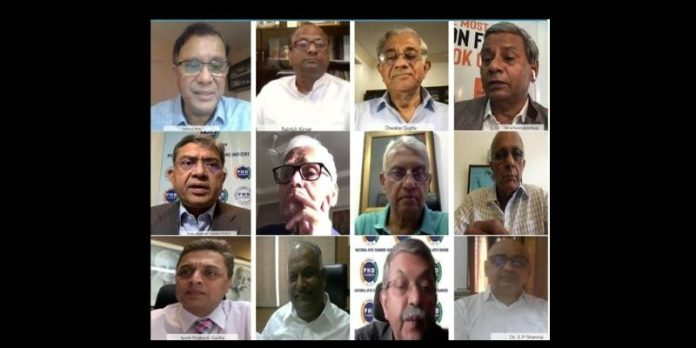Ex SBI Boss Rajnish Kumar Bats For Freedom For PSU Banks
PSU banks need to be free of operational control, says former State Bank of India chairman Rajnish Kumar
NEW DELHI, Apr 20 (The CONNECT) – The public sector banks are one of the biggest contributors to nation-building and they need to be free of operational control for helping them achieve full efficiency, according to former State Bank of India chairman Rajnish Kumar.
Public sector banks play a very crucial role in shouldering the responsibility of initiating most of the government’s schemes for which they need to be compensated rather than infusing fresh capital in them, he said speaking at the event organised by the PHD Chamber of Commerce (PHDCCI). He preferred a compensation structure for the PSU banks who are involved in implementing various government programmes.
Addressing at an interactive virtual session on ‘Privatization of Public Sector Banks- Open Issues, Challenges & Way Forward’ Kumar forecast that the government is planning sweeping banking reforms in the current year, similar to what the earlier government did in the year 1990 with the liberalization of the Indian economy.
There was an era of complete control 51 years ago, he recalled, then the government decided to nationalise banks to help them reach heights. The situation is completely different now. The government at present can no longer infuse fresh capital.
Harun Rashid Khan, Former RBI Deputy Governor, said rather than going into the debate of privatization of banks, one needs to undertake a SWOT analysis of both the public and private banking system.
The government was successful in implementing several of its programmes only because of the participation of the public sector banks, he argued. Schemes like the Jan Dhan Yojana, where more than 40 crore bank accounts were opened for people living in the remotest parts of the country, would not have been successful without the help of the public sector banks that have wider and deeper reach in the country, he added.
Former SBI MD Diwakar Gupta, who is also a former Vice President of the Asian Development Bank of India, explained that public sector banks have lost a lot of capital that has been infused over the last several years rather than creating wealth for themselves as they are also involved in several of the government’s social schemes. While there is a need to privatize some large public sector banks, the country equally needs public sector banks to operate efficiently at the regional level. He stated that a mix of both the public and private sector banks is the need of the hour.
Before the privatization of these banks, he said, there is a need to create value in them. He also added that consolidation comes at a huge cost as the human resources in these banks cannot be redeployed due to trade union pressures.
Sanjay Aggarwal, president, PHDCCI explained that the proposed privatization of the public sector banks appears to be the only way to make them commercially viable. It is, however, difficult to anticipate if the proposed privatization will yield the desired results of improving efficiency and give a fillip to our banking sector. It would be interesting to see how this new phase will evolve, he said.




